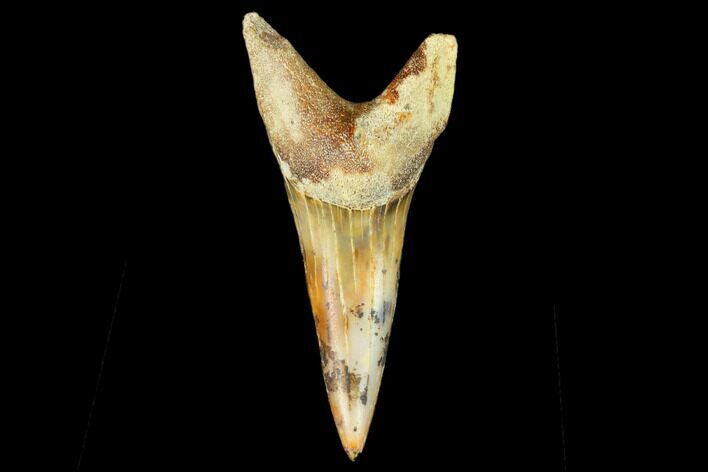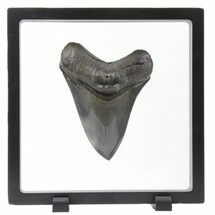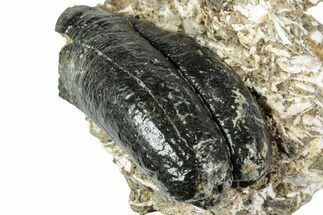This Specimen has been sold.
1.70" Colorful White/Mako Shark Tooth Fossil - Sharktooth Hill, CA
This is a lower, fossil shark tooth found at Sharktooth Hill near Bakersfield, CA. It could either be from Carcharodon (Isurus) planus or Carcharodon (Isurus) hastalis, but the lower teeth of these two sharks are indistinguishable. It comes from a specific site that produces some really colorful teeth. Quite impressive for a tooth that's 15.5 million years old.
About Fossil Broad-Toothed Mako Shark Teeth
Fossil teeth of the so-called “broad-toothed mako” represent one of the most iconic and debated shark fossils in the collector world. Traditionally classified as Isurus hastalis, these sleek, triangular teeth were long attributed to a large mako shark that lived from the Eocene through the Pleistocene and left a global fossil record. Later research reinterpreted the species as Cosmopolitodus hastalis, an extinct mackerel shark, before more recent studies placed it within the white shark lineage, renaming it Carcharodon hastalis. This shifting taxonomy means you’ll see a variety of labels in the marketplace, but we follow the most current interpretation and list them as Carcharodon hastalis. You can read more about the classification here.
These teeth are known for their elegant, blade-like shape, smooth cutting edges, and broad triangular crowns—features that suggest a powerful predator that occupied a role similar to today’s great white. While specimens can reach an impressive 3½ inches, teeth over 2½ inches are uncommon, and those exceeding 3 inches are genuinely rare. Found in marine deposits worldwide, Carcharodon hastalis teeth offer collectors a remarkable blend of beauty, scientific intrigue, and evolutionary significance within the storied lineage of white sharks.
Fossil teeth of the so-called “broad-toothed mako” represent one of the most iconic and debated shark fossils in the collector world. Traditionally classified as Isurus hastalis, these sleek, triangular teeth were long attributed to a large mako shark that lived from the Eocene through the Pleistocene and left a global fossil record. Later research reinterpreted the species as Cosmopolitodus hastalis, an extinct mackerel shark, before more recent studies placed it within the white shark lineage, renaming it Carcharodon hastalis. This shifting taxonomy means you’ll see a variety of labels in the marketplace, but we follow the most current interpretation and list them as Carcharodon hastalis. You can read more about the classification here.
These teeth are known for their elegant, blade-like shape, smooth cutting edges, and broad triangular crowns—features that suggest a powerful predator that occupied a role similar to today’s great white. While specimens can reach an impressive 3½ inches, teeth over 2½ inches are uncommon, and those exceeding 3 inches are genuinely rare. Found in marine deposits worldwide, Carcharodon hastalis teeth offer collectors a remarkable blend of beauty, scientific intrigue, and evolutionary significance within the storied lineage of white sharks.
About Sharktooth Hill
Sharktooth Hill is located in the foothills of the Sierra Nevada Mountains near Bakersfield, California. It represents an exposure of the Temblor Formation, a middle-Miocene marine deposit. 15 million years ago the sea levels were substantially higher, and central California was covered by what is known as the Temblor Sea.
Two highly fossiliferous bone beds in the formation were created when fossils originally deposited at the bottom of the sea eroded out of the rocks, were concentrated by ocean currents, and subsequently reburied. Because the fossils in these bone beds are reworked, only isolated teeth and bones are found in these beds.
Today, the original Sharktooth Hill is a National Natural Landmark, but private property surrounding it contains operational pay-to-dig fossil quarries.
Sharktooth Hill is located in the foothills of the Sierra Nevada Mountains near Bakersfield, California. It represents an exposure of the Temblor Formation, a middle-Miocene marine deposit. 15 million years ago the sea levels were substantially higher, and central California was covered by what is known as the Temblor Sea.
Two highly fossiliferous bone beds in the formation were created when fossils originally deposited at the bottom of the sea eroded out of the rocks, were concentrated by ocean currents, and subsequently reburied. Because the fossils in these bone beds are reworked, only isolated teeth and bones are found in these beds.
Today, the original Sharktooth Hill is a National Natural Landmark, but private property surrounding it contains operational pay-to-dig fossil quarries.
SPECIES
Carcharodon (Isurus) sp.
LOCATION
Sharktooth Hill, Bakersfield, CA
FORMATION
Temblor Formation
SIZE
1.70" long
CATEGORY
SUB CATEGORY
ITEM
#122717
We guarantee the authenticity of all of our specimens.
 Reviews
Reviews











